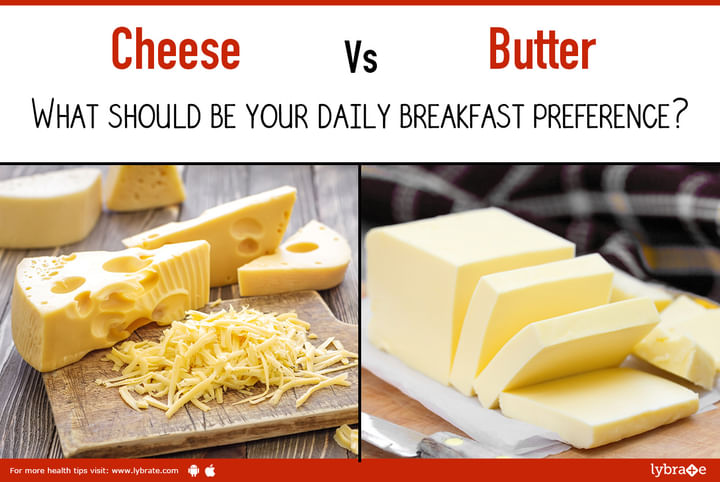Cheese vs Butter- What should be your daily breakfast preference?
Cheese vs Butter- What should be a part of your daily breakfast?
Both cheese and butter taste great, but when it comes to making them a part of your daily diet, you must keep their nutritional content in mind. Check how they rate nutritionally.
1. Calorie content
Butter is much higher in calorie content than cheese. While 100 grams of cheese have 349 calories, the same amount of butter comprises 717 calories. Moreover, 306 of the calories present in cheese are in the form of fat, while 713 calories come from fat in butter.
2. Fat content
Cheese and butter are both made from milk, but their fat content differs due to their different methods of preparation. 100 grams cheese contains 32 grams of fat, with 18 grams of saturated fats and 1.1 grams of trans fats. On the other hand, the fat content of butter is 81 grams per 100 grams butter, with 51 grams of saturated fats, and 3.3 grams of trans fats. This is the reason why butter is mostly avoided by people who aim at maintaining optimum weight.
3. Vitamin and protein content
There is only 0.8 gram of protein in butter, in comparison to 18 grams in the same quantity of cheese.
However, both cheese and butter are rich in Vitamin A and choline, containing about 945 IUs and 2499 IUs vitamin A per 100 grams respectively. Vitamin A is known for improving your vision, boosting immunity and promoting cell growth. Also, Vitamins E and K, and folate are present in small amounts in cheese and butter. They ensure good health of your red blood cells, help in blood coagulation and in maintaining bone metabolism (the process of forming new bone tissues). Additionally, cheese also contains vitamin B6, B12 and betaine.
4. Mineral content
Ample amount of minerals like calcium, phosphorus and potassium are present in both cheese and butter, which help in strengthening your muscles, minimising the chances of osteoporosis, maintaining acid-base balance in your body and diminishing the chances of heart diseases. Moreover, cheese also contains iron, selenium and zinc in smaller amounts, whereas butter has traces of fluoride, zinc, selenium and magnesium, which enhance your immunity and promote fertility among both men and women.
5. Energy giving capacity
Butter being rich in fat can boost up your energy level instantly. While cheese also provides your body with energy, it does not have an instant action like butter.
If you would like to consult with me privately, please click on 'Consult'.



+1.svg)
